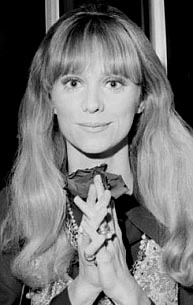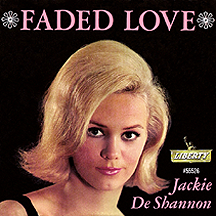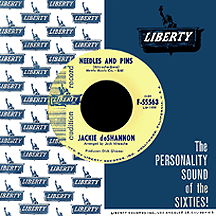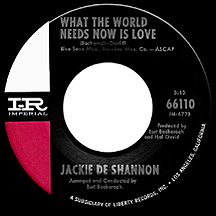JACKIE DeSHANNON
How does a singer achieve longevity? Female vocalists in particular had a disadvantage in the '50s and '60s competing in a more male-dominated industry than we have today. Two lucky breaks or three, randomly spaced a few years apart, can equal a kind of staying power. But to take control of the situation it helps to do more than one thing well: playing one or more musical instruments, or writing songs if one has the knack. Oh, and good looks don't hurt either. Despite more downs than ups, Jackie DeShannon pulled it off.
Born in 1944 in Hazel, Kentucky, Sharon Lee Myers showed an early musical aptitude and with the encouragement of her parents landed a spot on a radio show at age six, performing country tunes. By the time she was eleven she was hosting a show on the station. A career in music was her only focus from the start. In 1957, at just 13 years of age, Sharon recorded a one-shot single for Gone Records under the name Jackie Dee, followed by another single in '58 for Liberty called "Buddy," using the same name. Those early efforts had a rock and roll/rockabilly feel, and were followed by singles on Dot and the small PJ label as Jackie Shannon including a tough-girl cover of Elvis Presley's "Trouble" from King Creole...and she was pretty experienced-sounding for a 15-year-old! Eddie Cochran heard the two songs and was impressed, contacting Sharon and introducing her to his girlfriend at the time, Sharon Sheeley, also a budding singer-songwriter (on the verge of penning a number one hit, "Poor Little Fool" by Ricky Nelson). The two Sharons went on to write songs together for several years.
In 1960, she signed a long-term contract with Liberty Records, whose label executives felt her given name didn't have much marketability. They also weren't wild about the name Jackie Dee (feeling it was too similar to actress Sandra Dee) or Jackie Shannon, and finally settled on a combination of the two, Jackie DeShannon. Her first single near the end of '60, "Lonely Girl," and three follow-ups in 1961 went largely unnoticed, but it wasn't a completely unsuccessful year, as she hit the top 40 twice that summer as a writer, with Brenda Lee's "Dum Dum" and The Fleetwoods' hit "(He's) The Great Impostor," both co-written with Sharon Sheeley. They collaborated on several more songs for Brenda, including the 1962 hit "Heart in Hand."
"The Prince" and "You Won't Forget Me" received a little more notice from radio programmers in '62 than Jackie's earlier singles, but chart action remained elusive. 1963 was a better year, marking her first appearance on the national charts in February with "Faded Love," but it was upstaged by the Patsy Cline version released a few months later, after Patsy's death. A breakthrough of sorts came in the spring with "Needles and Pins," written by Jack Nitzsche and Sonny Bono and produced by Nitzsche in a style similar to Phil Spector, with whom he and Bono had also worked. With a strong girl group style and arrangement, the record was an immediate hit in Los Angeles, reaching the top ten. It didn't pick up much steam in other markets, yet despite the low ranking nationally, it was her biggest record to that point. A change-of-pace folk message song, "Little Yellow Roses," came next, then it was back to the girl-type sound with her own composition "When You Walk in the Room," a strong effort that made a little noise at the end of the year.
Jackie's career at the start of 1964 reverted, more or less, to where she'd been in '61: scoring big hits as a songwriter rather than singer. As the British Invasion unfolded in those early months, The Searchers became one of the first groups to make it in the U.S., scoring with mostly non-original material, and DeShannon must have been a favorite of the band: "Needles and Pins" was a big hit for them, followed a few months later by "When You Walk in the Room." She'd been upstaged again, only this time pulling in royalty payments as the second song's writer. She also penned, with Sheeley, the well-regarded "Break-A-Way," a fun, uptempo slice of soul by Irma Thomas on the flip side of her biggest hit, "Wish Someone Would Care" in spring 1964. About this time the film industry came calling, and Jackie appeared in Surf Party with Bobby Vinton.
Liberty stuck with Jackie throughout, reasoning her potential as a singer and/or songwriter set her apart from most female artists and would eventually reap rewards. In '64 she worked with songwriter Randy Newman and guitarist Ry Cooder and scored a coup for her career when she opened for The Beatles on their first U.S. concert tour, partly due to her exposure through the Searchers' records. Taking advantage of the British connection, she lived in England for a time, appeared on the TV show Ready Steady Go! and composed songs with prolific session guitarist Jimmy Page (before his glory days with The Yardbirds and Led Zeppelin). Britain's Marianne Faithfull hit big in the U.K. and U.S. in early '65 with one of Jackie's songs, "Come and Stay With Me."

Jackie's own long-awaited home-run hit occurred in the spring of 1965, as Liberty moved her to subsidiary label Imperial. Burt Bacharach and Hal David, already behind some of the mid-60s' biggest hitmakers including Dionne Warwick, Bobby Vinton and Dusty Springfield, came up with "What the World Needs Now is Love," a dynamic, inspiring and perhaps a bit over-the-top message song that shot Jackie to the top ten for the first time as a singer. She welcomed the exposure with concert tours and numerous television appearances, but may have spread herself too thin and was unable to capture the studio magic on successive Bacharach-David singles, even ones as solid as "A Lifetime of Loneliness" and "Come and Get Me." She satisfied the acting bug for a few years, with a role as a folk singer in the 1967 film C'mon, Let's Live a Little starring Bobby Vee, in addition to guest roles on the TV series My Three Sons, The Wild Wild West, The Virginian and a few others.
The music that followed the next couple of years included "I Can Make it With You," written by Chip Taylor (best known for The Troggs' megahit "Wild Thing"), landing her in a face-off with The Pozo-Seco Singers, whose version became the bigger hit. She made a little noise in '68 with Jaime Robbie Robertson's "The Weight," a much-recorded song released by Robertson's group The Band just before her version. By this time some may have perceived her as a one-hit wonder, but that idea was blown apart in 1969 with "Put a Little Love in Your Heart." A return to the inspiration-gimmick of "What the World Needs Now," it became her only top ten hit as a singer and songwriter while returning her to the fast track for one more round.
Jackie had been quite productive in the '60s and continued recording in the following decade with some success, but it was her songwriting that ultimately proved most rewarding. With Donna Weiss she composed "Bette Davis Eyes," a monster 1981 hit for Kim Carnes and pop culture phenomenon that became one of the biggest hit recordings of the last century, a distinction that, added to her other achievements, ranks Jackie DeShannon right up there with the best in the songwriting game.
NOTABLE SINGLES:
- I'll Be True - 1957
- Buddy - 1958
as Jackie Dee - Trouble - 1959
as Jackie Shannon - Lonely Girl - 1960
- The Prince - 1962
- You Won't Forget Me - 1962
- Faded Love - 1963
- Needles and Pins - 1963
- Little Yellow Roses - 1963
- When You Walk in the Room - 1964
- Oh Boy - 1964
- What the World Needs Now is Love - 1965
- A Lifetime of Loneliness - 1965
- Come and Get Me - 1966
- Windows and Doors - 1966
- I Can Make it With You - 1967
- Come On Down (From the Top of That Hill) - 1967
- It's All in the Game - 1966
- Me About You - 1968
- The Weight - 1968
- Put a Little Love in Your Heart - 1969
- Love Will Find a Way - 1969
- Brighton Hill - 1970
- Vanilla Olay - 1972




